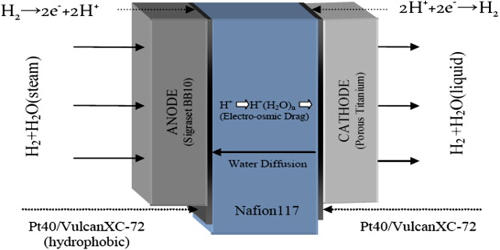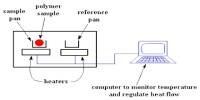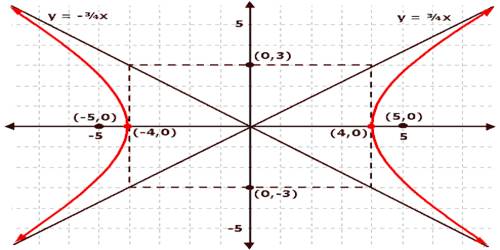The Electrochemical Hydrogen Compressor (EHC) is an electrochemical device, which could find a place in this scenario giving a solution for the hydrogen purification and compression for storage. It is a hydrogen compressor where hydrogen is supplied to the anode, and compressed hydrogen is collected at the cathode with an exergy efficiency up to and even beyond 80% for pressures up to 10,000 psi or 700 bars. A more modern method of compressing hydrogen, which doesn’t require mechanical force, is electrochemical compression.
Principle
Electrochemical compression involves using a proton exchange membrane (PEM), surrounded by electrodes, to pull low-pressure hydrogen through the membrane into a highly pressurized container. A multi-stage electrochemical hydrogen compressor incorporates membrane-electrode-assemblies (MEAs) separated by proton exchange membranes (PEMs) in series to reach higher pressures, when a current is passed through the MEA protons and electrons are generated at the anode.
Electrochemical compression is expected to allow hydrogen generators to both generate and compress hydrogen without the need to use an external, mechanical compressor. This type of compressor has no moving parts and is compact. With electrochemical compression of hydrogen, a pressure of 14500 psi (1000 bar) is achieved, this world record was set by HyET from the Netherlands in 2011. Water vapor partial pressure, current density, operating temperature, and hydrogen back diffusion due to the pressure gradient have an effect on the maximum output pressure. This will improve the energy to hydrogen production ratio, and therefore lower the cost of supplying compressed hydrogen fuel.
Applications
Electrochemical hydrogen compressors have been proposed for use in hydrogen refueling stations to pressurize hydrogen gas for storage. These electrochemical compressors are noiseless, scalable, modular, and highly efficient without the use of CFCs. Many different industrial uses of hydrogen, including using hydrogen as a fuel, require the gas to be compressed to minimize its storage volume and to meet the required process pressures.
















